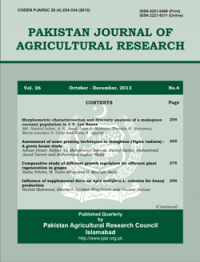Screening of Elite Chickpea Germplasm against Ascochyta Blight under Controlled Conditions
Screening of Elite Chickpea Germplasm against Ascochyta Blight under Controlled Conditions
Javed Anwar Shah1, Azhar Iqbal1, Muhammad Tariq Mahmood2, Muhammad Aslam3, Muneer Abbas4 and Ilyas Ahmad5*
ABSTRACT
Ascochyta blight (AB) caused by Ascohyta rabiei is considered as most disastrous and widespread fungal disease of chickpea across the world. Under favorable environmental conditions AB epidemics may cause partial to complete yield loss. Chickpea faces several biotic and abiotic stresses. Among biotic factors chickpea blight is most important factor responsible for drastic decline in productivity. Other disease management approaches are not more efficient and economical except to exploit the host plant resistance mechanism. The present study for screening of 60 elite chickpea lines was carried out for two consecutive years during 2017-18 and 2018-19 under controlled environment at pulses research Institute Faisalabad, Pakistan. Favorable conditions for disease incidence were developed by maintaining the temperature between15-20 °C and humidity >70%. Test entries were inoculated equally by spraying fungal suspension during initial flowering and pod filling stages. Observations on disease incidence were recorded by employing 1-9 Disease Rating Scale. Result showed that no line was resistant whereas, only eight chickpea desi lines were found moderately resistant, three lines were tolerant, seventeen were moderately susceptible and the rest thirty-two lines were found susceptible and highly susceptible. Identified moderately resistant lines (D-17001, D-17005, D-17008, D-17009, D-17011, D-17023, D-17024 and D-17032) may be included in chickpea breeding program for development of AB tolerant chickpea cultivars.
To share on other social networks, click on any share button. What are these?







